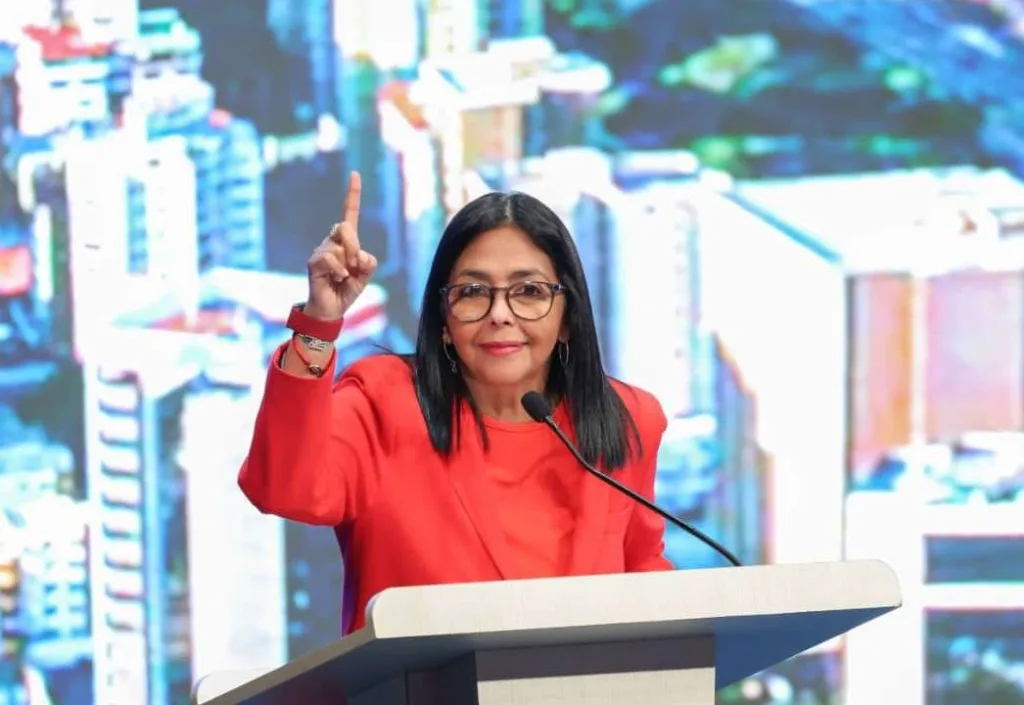
Vice president of Venezuela, Delcy Rodríguez, speaking at the Simposio Mundial de los Barrios (World Symposium of Neighborhoods) in Caracas. Source: Venezuela's office of the vice president.

Orinoco Tribune – News and opinion pieces about Venezuela and beyond
From Venezuela and made by Venezuelan Chavistas

Vice president of Venezuela, Delcy Rodríguez, speaking at the Simposio Mundial de los Barrios (World Symposium of Neighborhoods) in Caracas. Source: Venezuela's office of the vice president.
The vice president of Venezuela said the US is resorting to “another rehash” to try to seize Venezuela’s resources through violent means.
The executive vice president of Venezuela, Delcy Rodríguez, repudiated the latest maneuver by the United States government, which on Monday formalized the designation of the nonexistent “Cartel of the Suns” as a terrorist organization allegedly controlled by the Venezuelan government.
During the opening of the World Symposium of Neighborhoods, held at the Teresa Carreño Theater, Caracas, with the participation of Japanese architect Riken Yamamoto, Vice President Rodríguez said this was “another rehash” used to justify aggression against Venezuela.
“Today, Marco Rubio brought out another rehash about the Cartel of the Suns, [saying] that it is now a terrorist organization. They are ridiculous. They repeat and repeat themselves, and that is why they go from failure to failure.”
She emphasized that the drug-trafficking narrative lacks credibility and noted that if the US were truly interested in combating this problem, it would focus its policy on Ecuador, which has been identified as one of the world’s major drug distributors.
“If they really wanted to fight drug trafficking, they would have to go to Ecuador and look right there in the presidency of the Republic, which has the main cocaine-export company in the world hidden inside its banana distribution facilities,” said Rodríguez. “70% of the cocaine that is exported is done through Ecuador.”
Video: Bombshell Investigation Exposes Ecuadorian President’s Cartel Conspiracy
In this context, the vice president reiterated that Venezuela is neither a producer nor a trafficker of drugs, recalling that this “has been recorded over the last 27 years in all United Nations drug reports and even in DEA reports,” noting that the US drug agency (DEA) itself has affirmed that Venezuela is not a significant player in drug production or trafficking.
She asserted that the underlying purpose of this criminal US maneuver is “to try to justify an intervention. And why do they want to intervene? There are several reasons. Our natural resources, without a doubt. They say it openly: they want Venezuela’s oil and gas reserves without paying. They want the gold, the diamonds, the iron, the bauxite.”
On Monday, the Venezuelan Foreign Ministry issued a statement rejecting the announcement made by US Secretary of State Marco Rubio which made official the designation of the nonexistent “Cartel of the Suns” as a terrorist organization.
A model of justice and independence
Rodríguez praised the Venezuelan system. “Venezuela has a model of justice, social equity, and political participation. It is the model of national independence,” she declared.
She stressed that despite “multiple forms of threats and aggression,” the Venezuelan people remain focused on normal activities and development.
The World Symposium of Neighborhoods thus stands not only as a forum to discuss urban and social transformation—with prominent figures like Riken Yamamoto, who, according to Rodríguez, was able to witness the meaning of community life in Venezuela—but also as a platform to reaffirm the sovereignty and political project of President Nicolás Maduro’s government in the face of what it perceives as an international media and political offensive.
A model of democracy from communities
In her speech, Rodríguez stressed the unique character of the Venezuelan model. “Today, true democracy in Venezuela is being forged in our communities,” she said, explaining that in these communities, everyday matters are put to a vote. “Agreements are reached through dialogue and assemblies; agreements are expressed in the assemblies, and this is how we see communities emerge.”
The vice president traced a historical line connecting the thought of Commander Hugo Chávez with the present. She pointed out that the leader of the Bolivarian Revolution conceived territorial hegemony “to create a social fabric, to build the participatory democracy that later flourished under the president of the Bolivarian Republic of Venezuela, Nicolás Maduro, from whom emerged the great popular and communal power.”
She emphasized that far from being governed by an elite, Venezuela is governed by its people. “Here, a political elite in Miraflores does not govern. Here the organized people of Venezuela govern,” she said.
Communal economy as a response to the blockade
In economic matters, Rodríguez presented the communal economy as the key strategy to overcome international sanctions. “A different model is being created here—comprehensive development in the neighborhood, in the community—and we are working to establish local, regional, and national linkages to connect with larger economies,” she explained.
She asserted that this is “the miraculous path to overthrow the economic blockade… That is, for each community to have its own economic development. With the communal economy we can break the blockade imposed on our homeland.”
(Últimas Noticias) by María Milagros Sánchez
Translation: Orinoco Tribune
OT/CB/SL
Support Groundbreaking Anti-Imperialist Journalism: Stand with Orinoco Tribune!
For 7 years, we’ve delivered unwavering truth from the Global South frontline – no corporate filters, no hidden agenda.
Last year’s impact:
• More than 250K active users demanding bold perspectives
• 280 original pieces published in 2025 alone
Fuel our truth-telling: Every contribution strengthens independent media that challenges imperialism.
Be the difference: DONATE now to keep radical journalism alive!